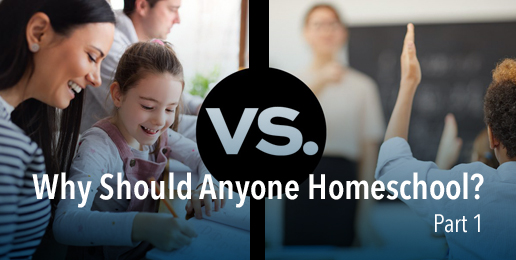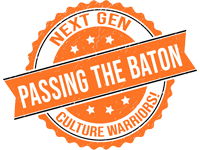
I’ve been blessed to write several dozen articles for IFI on topics ranging from transgender bathrooms to sports gambling to the politically correct concept of “ableism.”

It’s been a very fun ride. But, peering back through it all—the rants on the artificial fertility lobby and the exposés of abortion politics, the laments over the modern denial of science and the abandonment of logic—I still think back to the very first article I ever wrote for the Institute: COVID Boosted Idea of Educational Freedom.
In that article, I discussed the pandemic’s “silver lining:” pandemic-inspired lockdowns may have shut the nation indoors for months, but they also shut the nation’s kids out of their schools and replaced them with windows of Zoom instruction in their homes.
All of a sudden, multitudes of families could see into the classroom and witness the education their kids were getting—and not getting. Droves of families who were dissatisfied with the public school system took the opportunity to pull their kids out, enrolling in private, charter, and homeschooling options en masse.
And accordingly, homeschooling—which had been around for a few decades, but has mostly seemed to reside on the fringe of the academic world—suddenly gained a more prominent place in the national conversation.
I’m glad that the pandemic prompted many parents to move their kids out of the public school system, and that homeschooling has become an (even slightly) more prominent part of the national education system than before. But for me, homeschooling has never just been a “different way of doing things.”
It’s the way I lived my life for the decade-and-a-bit before I graduated. My parents decided to homeschool me and my siblings, and, looking back, I think it was one of the best decisions they ever made. And I’d like to share a couple of my thoughts on homeschooling, not as an education analyst dissecting a particular education strategy, but as a student who was personally blessed by it. There are two huge reasons I’m glad my parents homeschooled me, and I’ll start with the less significant one first. (Save the best for last, as they say.)
Because my mom homeschooled me, my education was, for the most part, a one-on-one training course that stretched me in the ways that I specifically needed to be stretched.
While I was trundling along through my math book at the lowly age of 8 or 9, my mom recognized that I was finishing my addition problems much more quickly than the expected schedule. So, she started giving me more than one lesson at a time, and it wasn’t long before I had finished four years’ worth of math in my first two years of school.
My mom knew what I needed, and she could easily give it to me because there weren’t 30 other kids vying for her attention. Instead of just filling time while waiting for others to finish in a classroom environment, I was able to spend my time diving farther into the subject than the norm prescribed.
As I got older, I discovered my passion for logic, analysis, and argumentation, and my mom was happy to adjust my schedule and give me a lot of time to spend on speech & debate. Instead of wasting my time reading whatever trendy fad books a public-school language arts class would have made me read, I spent my high school years seriously grappling with fundamental, civilization-shaping questions and learning how to articulate my thoughts clearly, concisely, and compellingly.
I learned so much more from my peers in Socratic discussions and my competitions presenting in front of judges than I ever would have otherwise. And I only was able to spend the amount of time on it that I did because my parents had the flexibility to bring up their child in the way he should go.
I’d better insert a quick clarification here. None of this is by any means intended to be “The Boastful Memoirs of a Stuck-Up (or Insecure) Homeschool Graduate.” I cannot claim credit for any of the blessings the Lord gave me growing up, and neither can anyone else for their own upbringing, ultimately.
All glory be to Him.
Neither is this intended to sound like a radio ad for some cure-all medication: “All you have to do is start homeschooling, and just sit back and watch your child blossom!”
Statistically, your child will perform better, but realistically, your child may not. It isn’t a magic pill for academic success. What it does provide, however, is the freedom to nurture your child along the paths he is naturally apt for—which in most cases does lead to academic success. And I’m so blessed that my parents did that for me.
I know I’m not the only one. One prominent researcher, Brian Ray, studied 45 peer-reviewed studies and found that in 78% of them, homeschoolers tended to outperform their public school counterparts. (Admittedly, not every study agrees, and Ray’s work has been strongly criticized by other academics and the media for methodological issues—so do your own homework as well. But there is still a sizeable—and that may be understating it—portion of young minds who are benefiting far more from their parents’ teaching than public school teaching.)
So, growing up, I always considered that to be the main reason my parents were homeschooling me: I was getting an education tailored to me. Sure, I always felt a little awkward when friendly grown-ups would ask me, “Where do you go to school?” but I knew I was getting a better education at home than at the local public school, and that far outweighed the oddity.
I was glad to be able to progress at my own pace, so I was happy with the arrangement.
But I was hardly aware of the much more important reasons that my parents’ choice was such a good one. Of all the reasons to homeschool in this day and age, academics is actually not the most important.
And Ray even agrees with me: In a talk he gave in 2019, he remarked, “You don’t home educate to get high test scores.”
So if even he wouldn’t say this is the most important reason to homeschool, what might it be? Stay tuned for part 2.





























